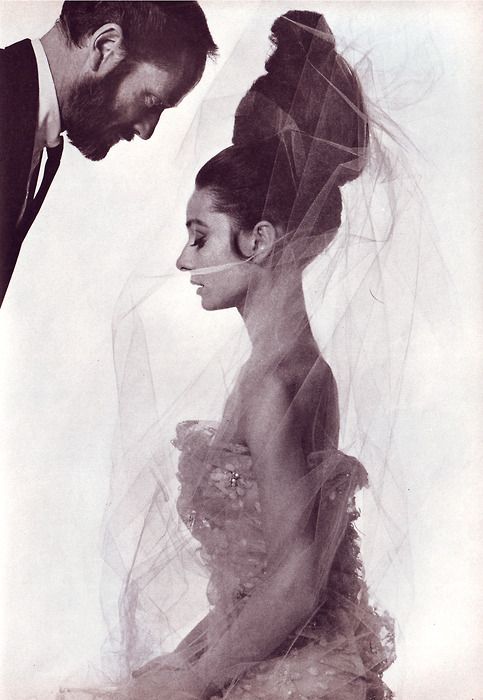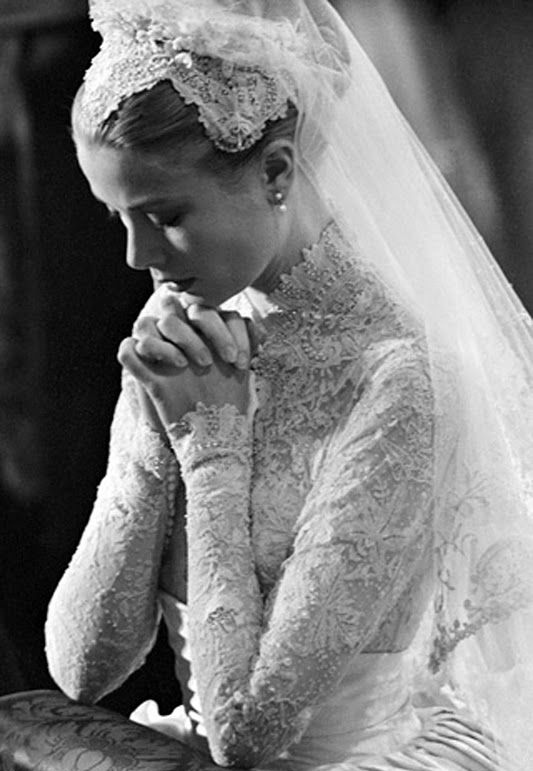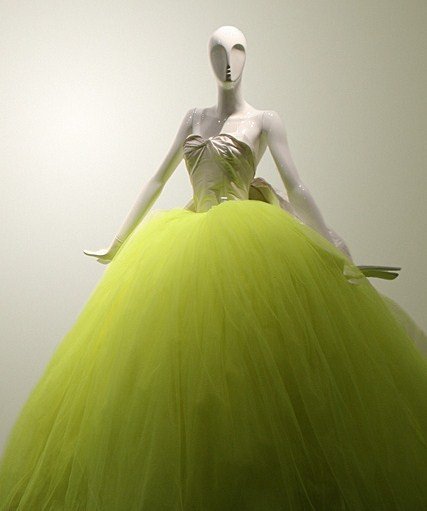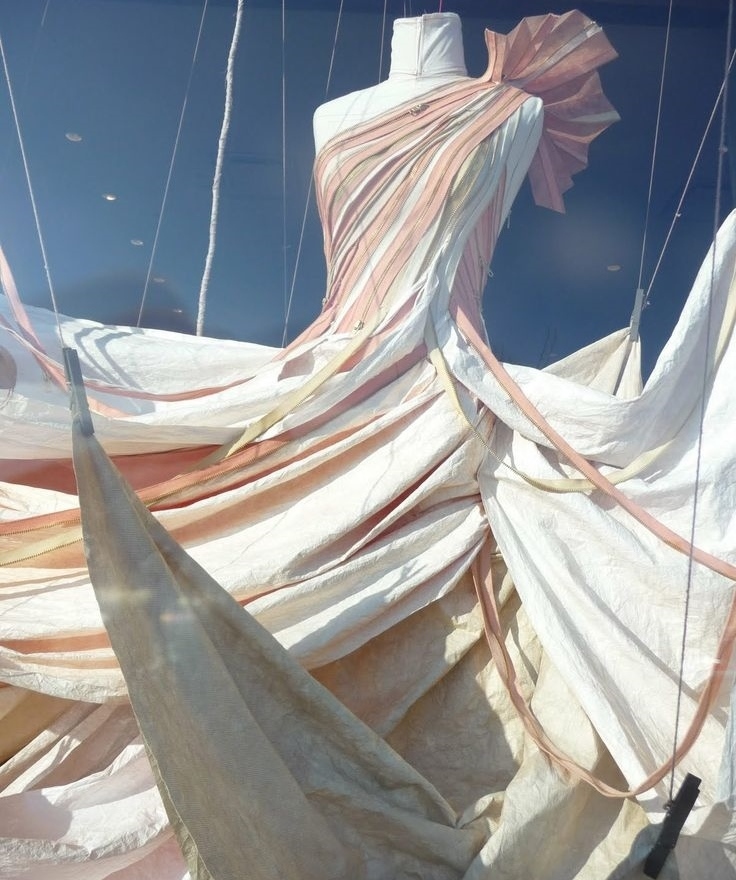A simple guide for different Wedding Dress Styles
To simplify the big puzzle of wedding dress styles, just answer these simple questions after reading the description of the wedding dress styles below and carefully observing the corresponding illustrative images.
1. What length wedding dress do you prefer? Short or Long?
- If you wish to have a wedding dress with a trail, your answer here will be long.
- Ofcourse you can also have a trail if you choose the short and long wedding dress option.
2. What style of skirt do you prefer?
- Trumpet VS Flare
- Ball gown VS Straight/Column/Sheath
- A-line VS Mermaid
3. What style of back design flatters your body shape? With a back or without?
4. What style of sleeves do you envision to have?
5. What waistline suits you best?
6. For the brides who want to get more wear out of their beautiful wedding dresses than just once on the big wedding day, I urge you to consider these dual functional and liberal options. Ofcourse the weather, the location of the wedding together with your body shape and personal style must also agree to this choice.
1. The length
|
Short wedding dress 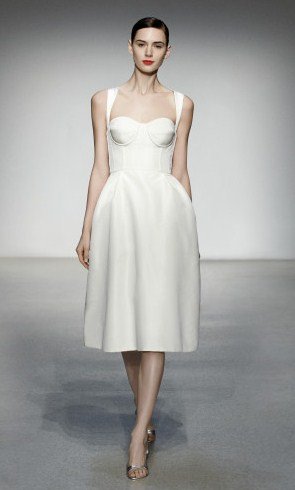 Depending on the location and season of your wedding day or your personal preference for a short dress, you might find yourself looking for a wedding dress that is not a traditional floor length wedding dress. If you are interested in a short wedding dress you may consider the following lengths:
|
Long wedding dress 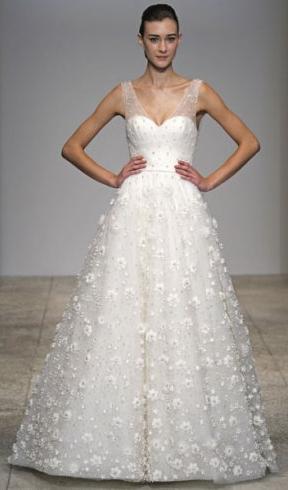 The floor length long skirt is a famous feature of a traditional wedding dress. Next to respecting traditions, if you are not exposed to many formal and gala events in your daily life, you might be the bride who is looking forward to wearing a long wedding dress and make your wedding day a memorable one with this choice. Long skirt wedding dresses is also recommended for brides who want to emphasize their bust area and hide the lower part of their bodies. With your body shape in mind you may choose from the following type of long length skirts for your perfect wedding dress:
|
|
Long wedding dress with a trail 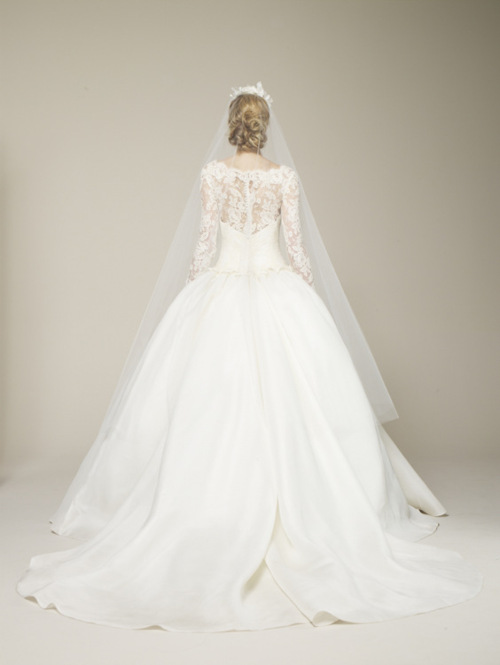 A wedding dress with a trail, short or long, is grand and dreamy. Just like the fairytale wedding dresses we've watched in Walt Disney animations or seen royalty marry in to their princes and kings in their royal wedding dresses. Tip. Even if you choose for a short length wedding dress no one can stop you from adding a tasteful elegant trail to the back to walk down the aisle in. |
Long wedding dress without a trail 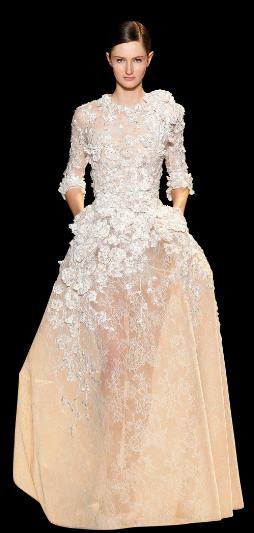 |
|
1-piece short and long wedding dress 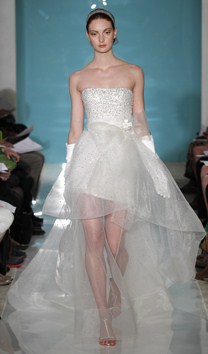 |
2-piece short and long wedding dress 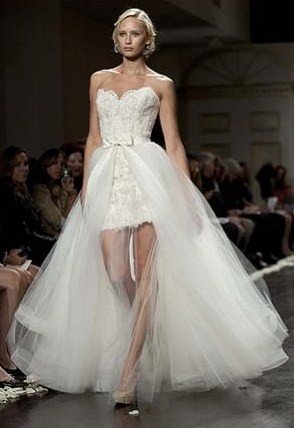 |
Tip: If you are undecided between the length of the skirt consider the following options:
- a 1-piece short and long wedding dress: short in the front and long in the back with a possible trail if you choose to have one.
- a 2-piece short and long wedding dress: in this case the long skirt is the detachable second piece that can be tied on or temporary fixed to the main short length dress under. This is a dual functional and money saving option for budget brides who will get 2 perfect wedding dresses with 1 purchase. You can transfer into the short option for the cocktails after the wedding dinner and you may even be able to get another wear out of this short wedding dress for another formal party or cocktail event.
2. The skirt
|
Ball gown / princess skirt 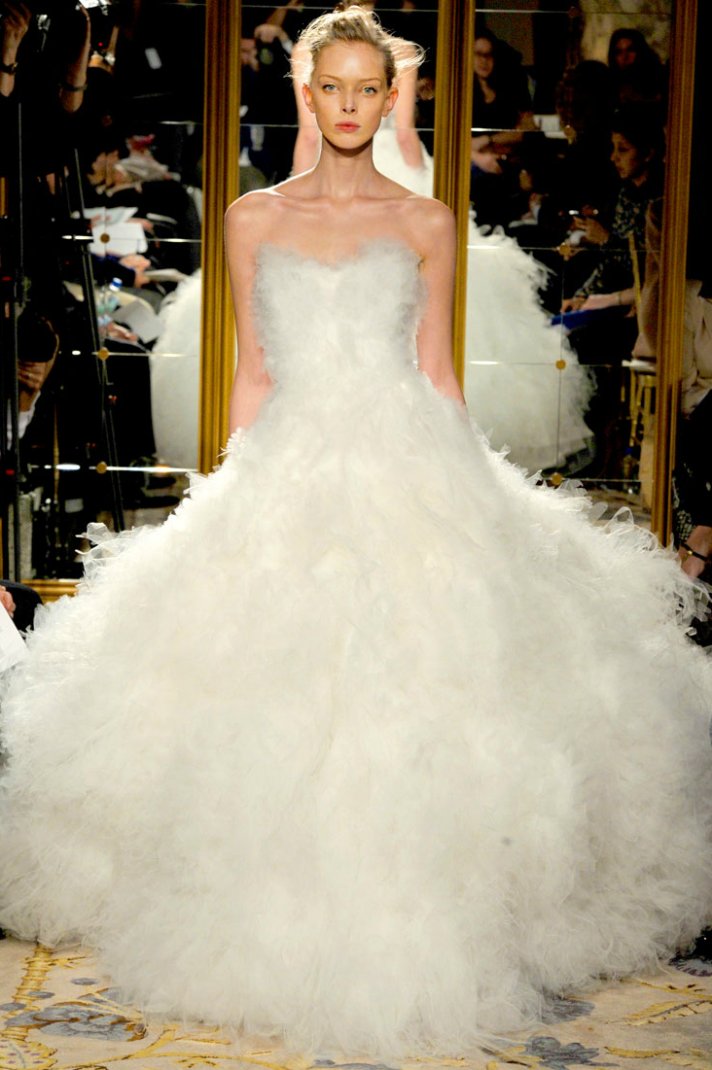 The ball gown wedding dress style is perfect for those brides looking for a fairytale wedding dress. This silhouette pairs a fitted bodice with a full skirt in this dreamy feathered Marchesa wedding dress. The ball gown dress is most appropriate for large and traditional weddings where the grand dress style will be consistent with the formality of the event. While this style can accommodate most body types, the ball gown is ideal for slender or pear-shaped figures as the full skirt helps to accentuate the waist and hide the lower body. If you have a large bust, this style will help to create the hourglass look since it emphasizes the waistline due to the fitted bodice and natural or dropped waist. If your height is on the shorter side, the volume of the ball gown can create false and unwanted illusions. You may not have the height to balance the size of the skirt. Also, for the figure of a full-breasted bride, the skirt could actually cause her to look larger. Tip. Unlike the ball gown skirt, body hugging designs such as the column/sheath dress can constrict your movement, including the ability to sit and dance as comfortably as you would wish on your big day. If you want a highly-constructed column dress, you may consider one that has enough stretch in the fabric or a slit in the back that will allow you to move more freely. |
Straight skirt 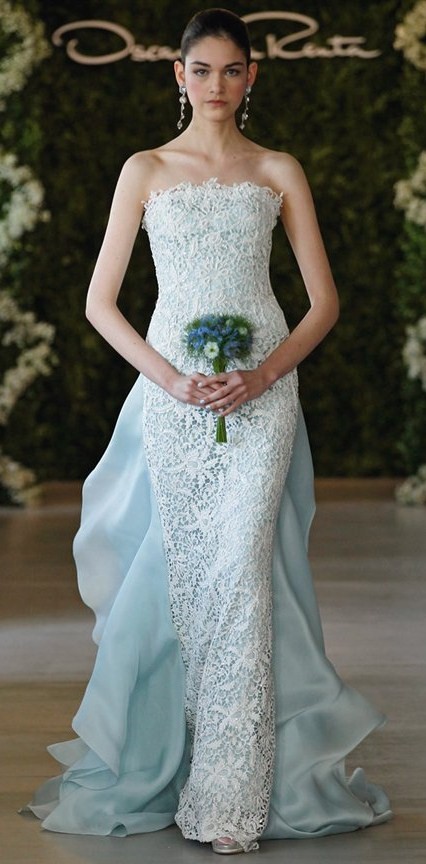 The straight or column dress has a narrow shape that flows straight down from the neckline to the hem. This straight or column silhouette demonstrated in the Oscar de la Renta wedding dress, also referred to as a sheath, tends to hug the body and show any and all of your curves. The straight dress is appropriate for all types of weddings, especially causal occasions on the beach, or intimate evening events at a banquet hall. The straight dress is best worn by lean figures, both short and tall. The elongating nature of this design will help petite brides appear taller. However, this dress type does not allow much room for hiding problem areas, such as a larger lower body. It can conceal minor flaws if you opt for a constructed column form that will stay in place. Also, straight/boxy shaped figures that do not have natural curves may consider accenting the waistline with a separate bodice or sash to create the illusion of a defined waist. |
|
Trumpet skirt 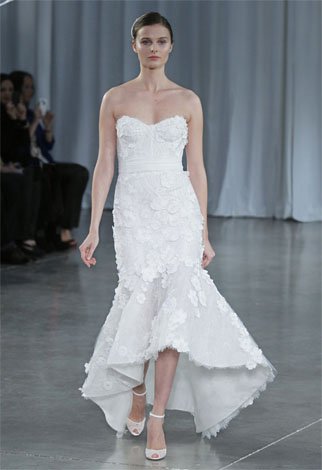 The trumpet silhouette features a gradually-flared skirt and a close-fitting bodice that skims the lines of the body, through the hips. Most trumpet wedding gowns begin to flare at about mid-thigh, and can be thought of as a sort of hybrid between the mermaid silhouette and the modified A-line silhouette. |
Mermaid skirt 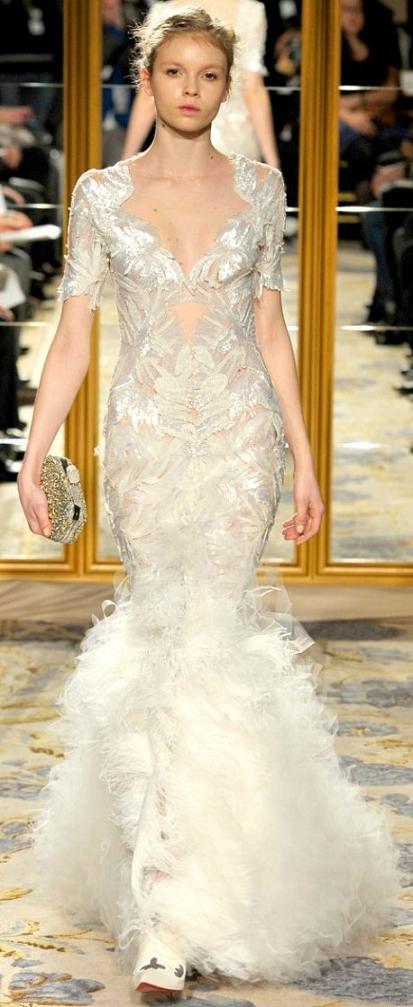 The mermaid silhouette contours to the body from the chest to the knee, then flares out to the hem. This is a very sexy look that highlights the curves of a woman’s body. For this reason, you must be confident and comfortable in your skin to pull off this dramatic style. |
|
A-line skirt 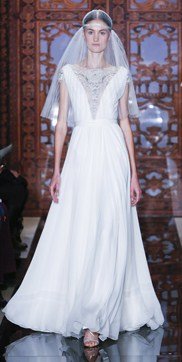 The A-line dress features a shape that is fitted around the bodice, illustrated clearly in the Reem Acra fall 2013 A-line wedding dress, and flows out to the ground, resembling the outline of an uppercase A. The dress flows fluidly from the bust to the hem with an unbroken line. Due to its classic and simple style, the A-line dress is appropriate for any occasion, from a quiet backyard gathering, to a traditional church ceremony. The A-line dress is flattering on almost all body types. The long lines of the princess cut dress can create the illusion of height on a shorter body, as well as slim down a rounded figure. The full skirt of the A-line can also hide a larger lower body, or create the illusion of curves on a narrow frame. Since the A-line dress is so versatile, simple modifications to the neckline, waistline, or fabric can accentuate your best features and hide those your not so fond of. |
Flared skirt 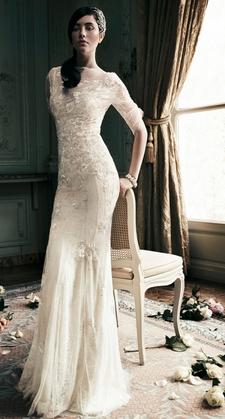 While the Trumpet skirt starts to flare gradually, at about mid-thigh and the Mermaid flares dramatically, at or below the knee, the Flare skirt flares right below the hips usually with a flowing fabric. Tip 1. Unlike the A-line wedding dress style, the mermaid and flare style skirts are not for everyone! These daring designs are best worn by slender figures, both short and tall. Since the mermaid and the fit and flare dress are made to hug the body and show every curve, it is not well suited for those plus size brides with full figures. |
Tip 2. If you are on the voluptuous side and want to accentuate your curves, Mermaid or Fit and Flare dresses are the perfect styles for you. The most important thing to keep in mind when considering these styles is whether or not you will feel comfortable wearing them on your big day. You may have a flawless figure perfect for this type of dress, but if you do not feel confident in them, avoid them.
3. The back design
|
Backless wedding dress 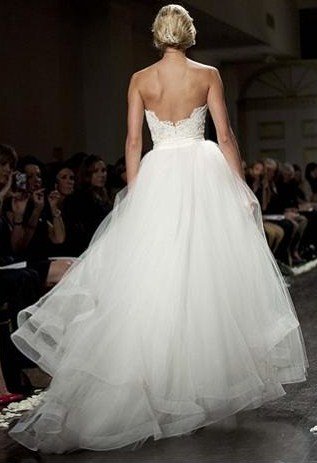 Its no brain teaser, if you have a beautiful back with feminine shoulders and getting married during the warm seasons of spring and summer, opt for a backless wedding dress to show off these assets and consider the following necklines:
|
Wedding dress with a back 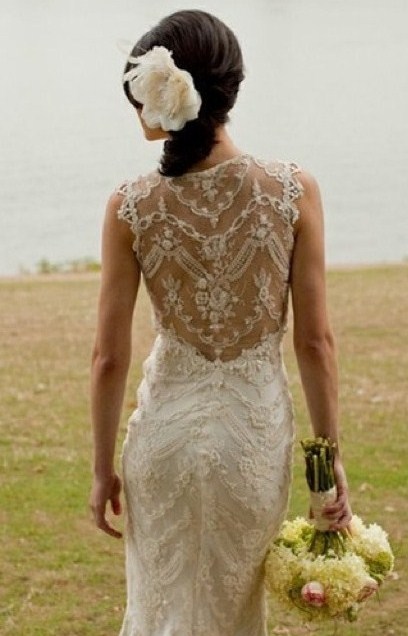 If you are in favor of a closed back, this doesn't mean that you don't have a beautiful back and won't be able to show off what you have. But in fact, with the right selected design you will be highlighting your back gracefully and bringing attention to where you want it. Remember your back does get a lot of exposure during your wedding as you walk down the aisle and dance with your husband to be on your first dance after the ceremony and dinner. If you are interested in the playful and very sexy covered back option consider the following:
|
4. The sleeves
|
Long sleeves 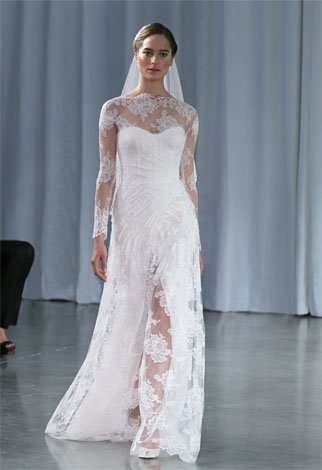 In this Monique Lhuillier bridal gown, the beautiful lace long sleeve is a seamless extension of the illusion neck covered in lace. This design element not only checks the traditional box off but also checks the super sexy and elegant boxes too. There are a number of long sleeve designs for you to be aware of next to this tight fitting sheath style such as the bishop and peasant sleeves which are looser and end at the wrist with a tight fitting cuff. You can also consider 3/4 length sleeves ending below the elbow:
|
Without sleeves 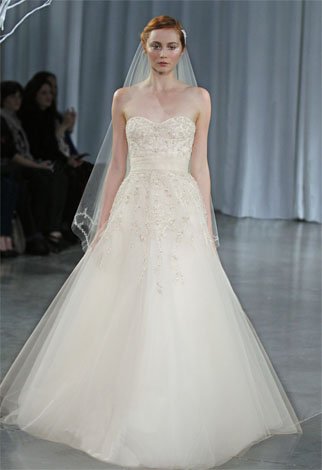 A strapless or open neck-line looks flattering on many women because it has the ability to present the shoulder, neckline and the bust area in a very feminine and sexy way. While a strapless neckline may do the much desired magic for the small busted ladies, for the big and heavy busted ladies it does not offer much support to hold the bust area up no matter how couture and well fitted a gown might be. Tip: Also for those brides who choose to go for this option please practice your posture. A good posture to support this neckline is when your shoulder blades are together and eased down your back. So shoulders back slightly but softly with your bust perked up. Avoid sticking your chest out in a soldier-like stance. |
|
Cap sleeves 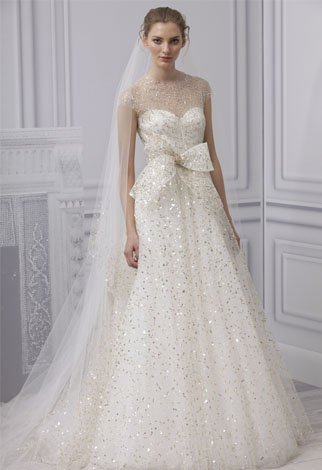 Cap sleeve is a very short sleeve covering only the shoulder, not extending below the armpit level. In this dazzling Monique Lhuillier number, the cap sleeve is an extension of the sparkly illusion neck creating a very sexy neckline but covered. |
Juliette sleeves 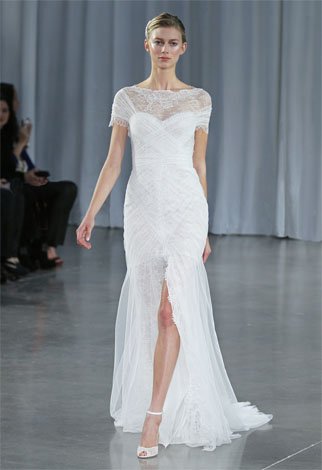 Juliette sleeve is a longer sleeve than the cap sleeve, with a puff at the top and tight to the wrist line. Please note that in the given Monique Lhuillier wedding dress example above, Monique has modernized this ancient sleeve design to a short sleeve without a puff. |
Historical fact: The Juliette sleeve was inspired by fashions of the Italian Renaissance and named after Shakespeare's tragic heroine; popular from the Empire period through the 1820s fashion.
|
Off the shoulder / Boat neck sleeve 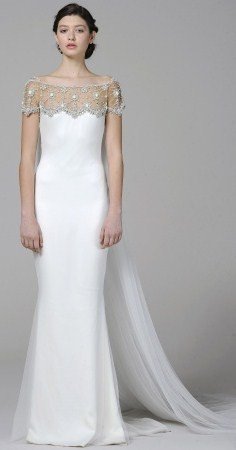 |
One-shoulder sleeve 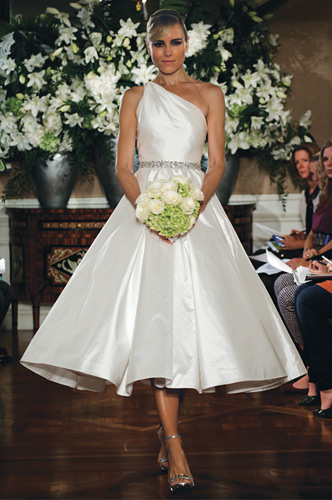 |
5. The waistline
|
With defined waistline 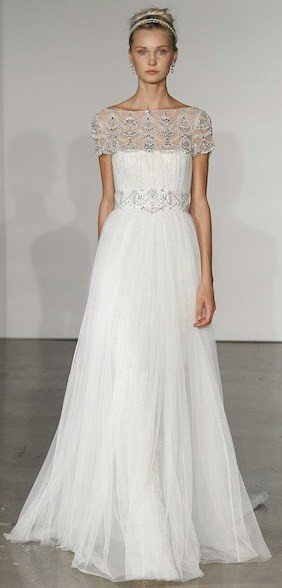 |
Without waistline: boxy shape  |
|
Empire / raised waistline 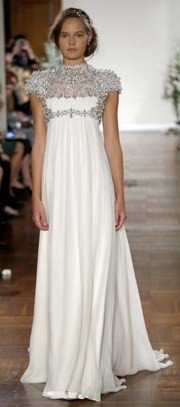 An empire dress style is defined by the raised waistline that sits just below the bust, illustrated clearly in this Jenny Packham wedding dress with the lowest silver band, from which the rest of the dress flows down to the hem. |
Natural waistline 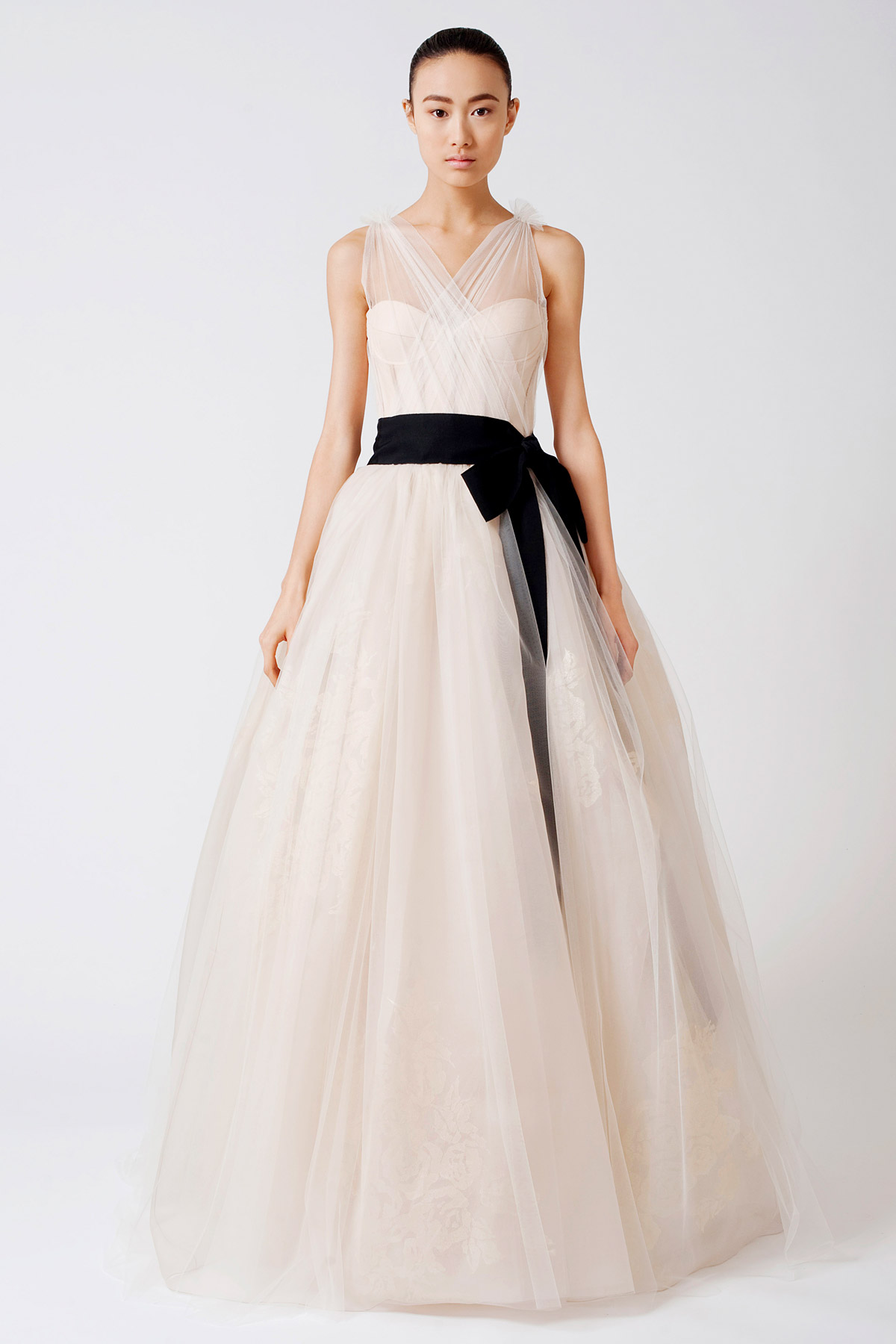 The natural waistline is the line that joins the bodice and the skirt of this Vera Wang wedding dress with a black ribbon belt. This line falls above the hip bones and navel of the female body. |
While the empire dress fits well on most body types, it is especially suited for those brides with a smaller bust since it draws attention to the neckline and creates definition. Added accents and fabric embellishments, such as capped sleeves or delicate bead work, will help to draw attention to your chest and neckline, and therefore create the illusion of a fuller bust.
Oddly enough, this cut can also work to conceal a large bust by controlling and minimizing the size of your breasts.
The design of the empire dress is also ideal for covering other unwanted body features such as a long torso, short legs, or a pear shaped figure. Since the dress flows from the bust line, it can easily leave these areas undefined.
|
Lowered waistline 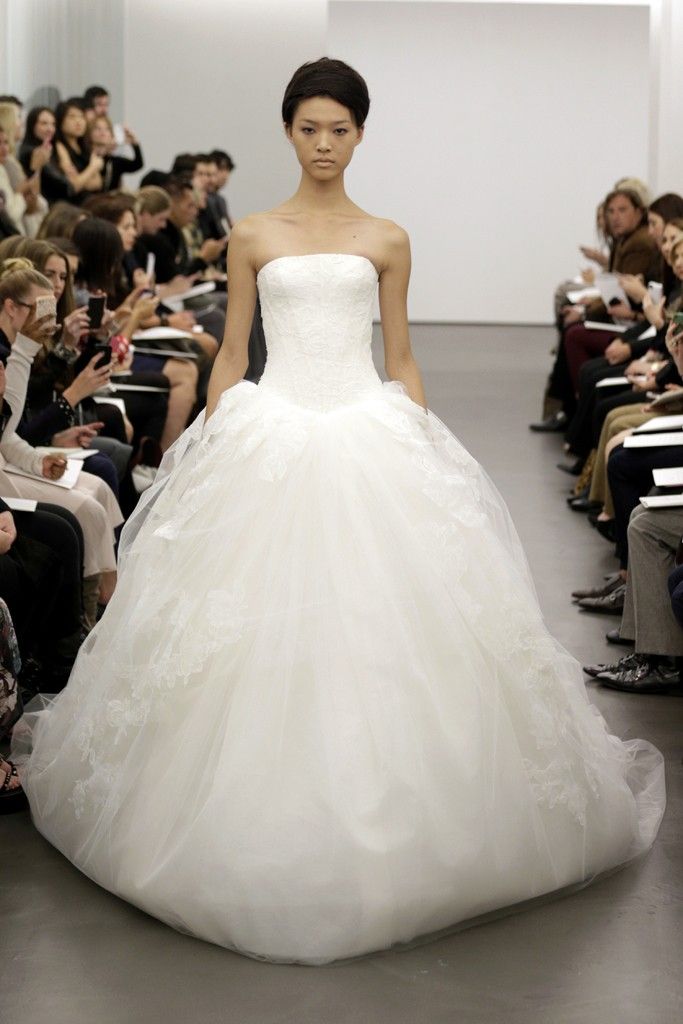 |
Lowered waisline cut with a belt at the natural waistline 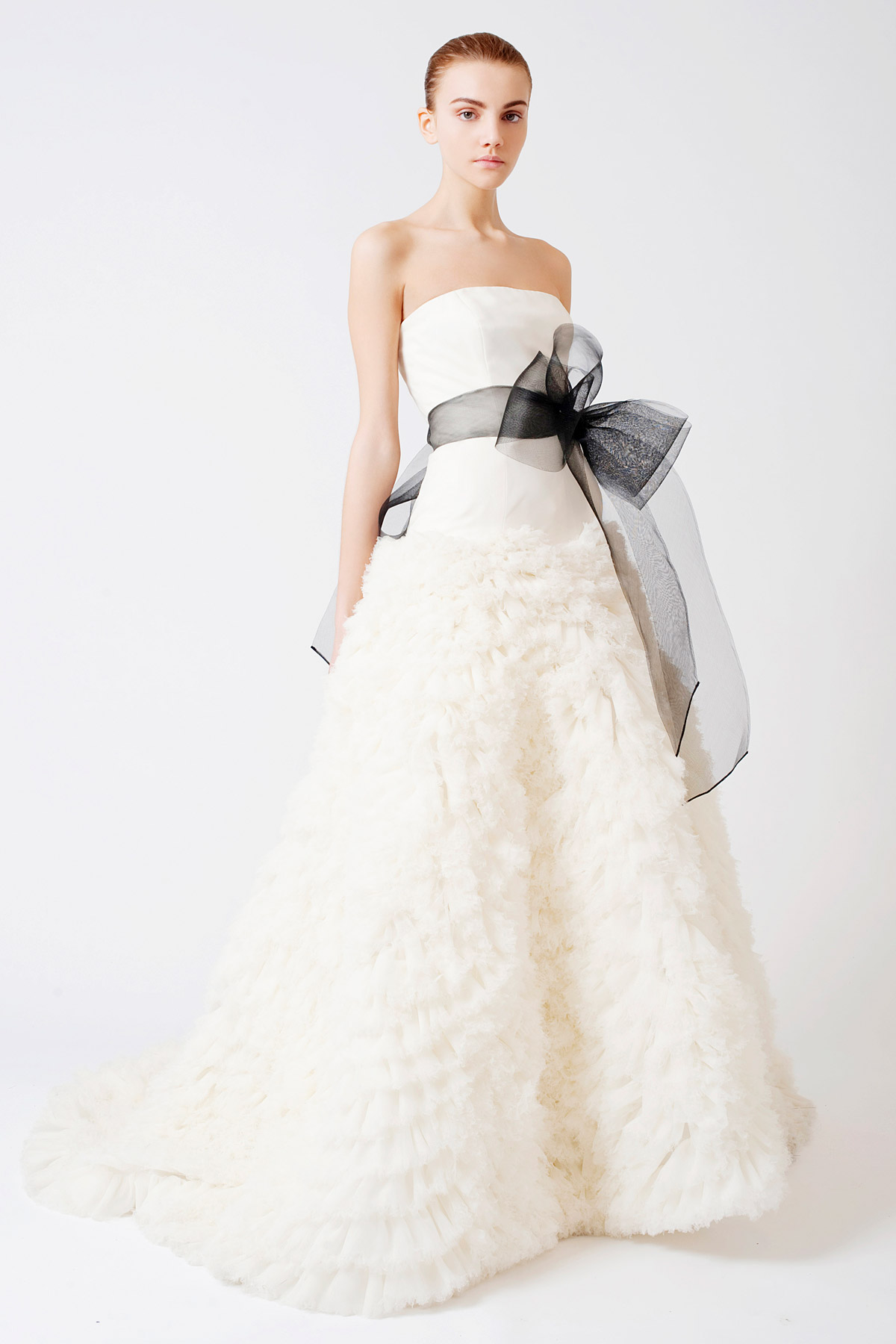 |
6. 3 and 2-piece wedding dresses
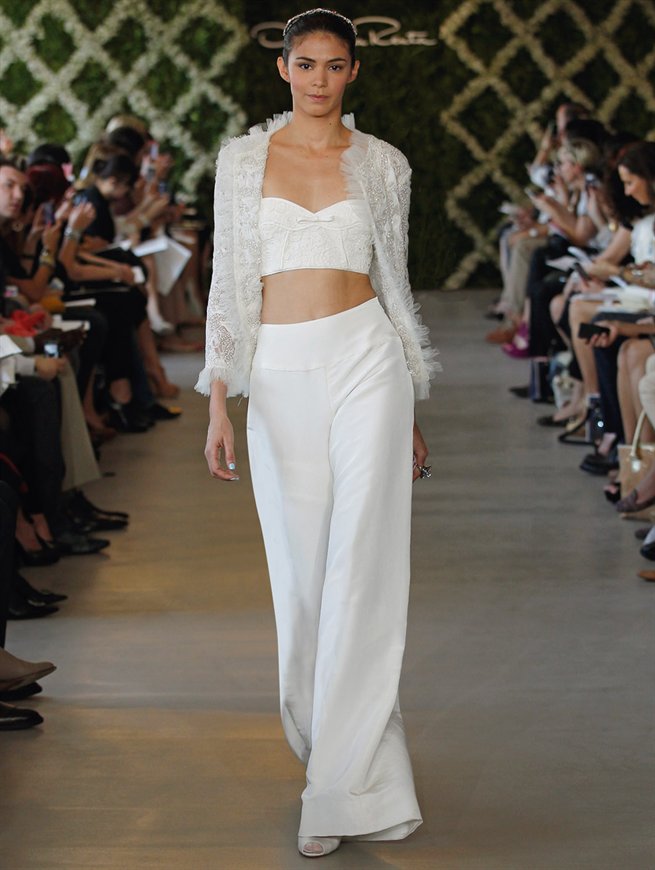 |
As you know, there are many different types or styles of wedding dresses. It helps to know your female body shape and which wedding dress style would look the best to flatter your body shape. Besides your body shape, please also take into account other factors like your age, weight, your personal style as well as the season you are getting married in and the venue of your wedding! |
Most Popular and Relevant Articles
Back to Where to start in finding your perfect wedding dress?
Back to Wedding Dresses i Love
